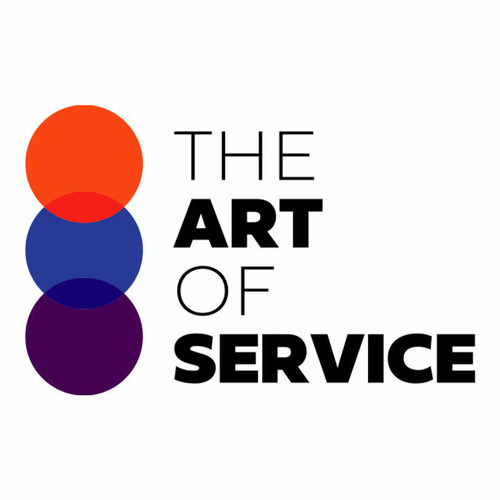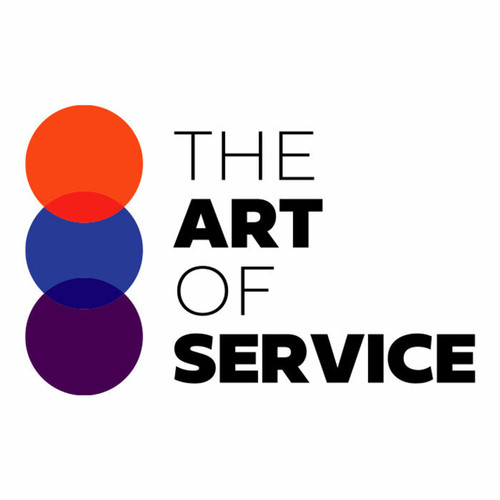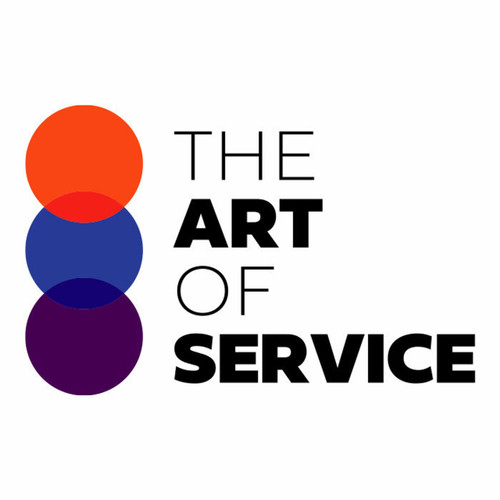Say goodbye to guessing and hello to results by utilizing our dataset of 1531 prioritized requirements, solutions, benefits, results, and real-life case studies.
Don′t waste any more time sifting through scattered information – our Knowledge Base has everything you need in one convenient place.
As a professional in the field of End Of Life Care and Healthy Aging, you know that every decision must be made carefully and efficiently.
Our Knowledge Base provides you with the most important questions to ask – organized by urgency and scope – ensuring that you make the best decisions for your clients every time.
Say goodbye to overwhelming research and hello to streamlined decision-making.
But our Knowledge Base isn′t just for professionals – it′s also perfect for individuals planning their own End Of Life Care and Healthy Aging journey.
With clear and concise information, anyone can use our dataset to create a personalized plan that fits their specific needs and goals.
No expensive consultations or confusing products necessary – our product is accessible and affordable for all.
Don′t settle for other alternatives – our End Of Life Care and Healthy Aging Knowledge Base stands out from the competition.
Unlike other products, we provide a detailed overview of specifications and a wide variety of benefits.
We also offer in-depth research on this topic, giving you the most comprehensive and up-to-date information available.
Plus, our dataset includes information specifically tailored for businesses, making it the perfect resource for professionals and organizations alike.
But like any product, there are always pros and cons to consider.
That′s why we′ve provided a detailed description of what our product does, so you can make an informed decision.
We believe in transparency and want you to have all the information you need before making a purchase.
Say hello to success and goodbye to uncertainty with our End Of Life Care and Healthy Aging Knowledge Base.
Whether you′re a professional looking for the best resources for your clients or an individual planning your own journey, our dataset has everything you need to achieve your goals.
Try it out today!
Discover Insights, Make Informed Decisions, and Stay Ahead of the Curve:
Key Features:
Comprehensive set of 1531 prioritized End Of Life Care requirements. - Extensive coverage of 97 End Of Life Care topic scopes.
- In-depth analysis of 97 End Of Life Care step-by-step solutions, benefits, BHAGs.
- Detailed examination of 97 End Of Life Care case studies and use cases.
- Digital download upon purchase.
- Enjoy lifetime document updates included with your purchase.
- Benefit from a fully editable and customizable Excel format.
- Trusted and utilized by over 10,000 organizations.
- Covering: Foot Care, Social Events, Social Connection, Cognitive Stimulation, Aging In Place, Cholesterol Levels, Flexibility Training, Occupational Therapy, Physical Therapy, Physical Activity, Medication Adherence, Life Satisfaction, Energy Levels, Family Relationships, Gut Health, Mood Management, Healthy Eating, Healthy Aging, Oral Care, Hearing Tests, End Of Life Care, Dietary Supplements, Positive Attitude, Goal Setting, Life Transitions, Outdoor Activities, Personal Growth, Cognitive Function, Nursing Homes, Coping Skills, Relaxation Techniques, Mobility Aids, Preventive Care, Supplement Use, In Home Services, Holistic Approach, Retirement Planning, Portion Control, Falls Prevention, Continuing Education, Speech Therapy, Emotional Well Being, Disease Prevention, Geriatric Care Management, Immune System, Memory Function, Whole Foods, Self Acceptance, Healthy Habits, Mental Wellness, Community Service, Brain Exercises, Fall Prevention Strategies, Screening Tests, Community Resources, Elderly Care, Stress Management, Technology Use, Self Care, Vision Health, Social Engagement, Assisted Living Facilities, Adaptive Equipment, Social Connections, Brain Health, Fall Prevention, Housing Options, Weight Management, Fall Detection, Healthy Relationships, Work Life Balance, Social Support Network, Strength Training, Emotional Support, Recovery Time, Support Group, Pain Management, Balance Training, Resistance Training, Joint Health, Intermittent Fasting, Memory Improvement, Dietary Needs, Senior Living, Heart Health, Pain Relief, Fall Risk Assessment, Advance Directives, Group Fitness, Volunteer Work, Transportation Options, Emergency Preparedness, Long Term Care Planning, Functional Mobility, Financial Planning, Mindful Eating, Quality Of Life
End Of Life Care Assessment Dataset - Utilization, Solutions, Advantages, BHAG (Big Hairy Audacious Goal):
End Of Life Care
Yes, end of life care planning and assessment processes involve consideration of a consumer′s preferences for their final stage of life.
1. Yes, they do. - Ensures that the consumer′s end-of-life preferences are taken into account in their care plan.
2. Advanced directives - Allows the consumer to communicate their end-of-life preferences in case they become unable to do so.
3. Palliative care - Focuses on improving quality of life and managing symptoms for those with life-limiting illnesses.
4. Hospice care - Provides specialized care and support for the individual and their family during the end-of-life stage.
5. Counseling and support groups - Help individuals cope with emotional and spiritual challenges during end-of-life care.
6. Family involvement and communication - Ensures the consumer′s wishes and values are respected and followed by family members.
7. Respect for cultural and religious beliefs - Honors the consumer′s cultural and spiritual needs during end-of-life care.
8. Pain management - Ensures the individual is comfortable and free from pain during their end-of-life journey.
9. Care coordination - Ensures that all aspects of care align with the individual′s end-of-life preferences and goals.
10. Education and information - Provides resources and knowledge to the consumer and their family about end-of-life care options.
CONTROL QUESTION: Do care planning and assessment processes include consideration of the consumers end of life preferences?
Big Hairy Audacious Goal (BHAG) for 10 years from now:
By 2030, end of life care planning and assessment processes will prioritize the inclusion and consideration of the consumer′s personal preferences, beliefs, and values regarding their end of life care. This will be achieved through nationwide implementation of comprehensive care planning tools and educational programs for healthcare professionals, as well as increased public awareness campaigns about the importance of proactive end of life care planning. This will result in a shift towards a more person-centered approach to end of life care, ensuring that each individual′s wishes and goals for their end of life journey are respected and honored. This bold and ambitious goal will ultimately lead to improved quality of life and dignity for individuals at the end of their lives, and greater satisfaction and peace of mind for their loved ones.
Customer Testimonials:
"The variety of prioritization methods offered is fantastic. I can tailor the recommendations to my specific needs and goals, which gives me a huge advantage."
"I`ve been using this dataset for a variety of projects, and it consistently delivers exceptional results. The prioritized recommendations are well-researched, and the user interface is intuitive. Fantastic job!"
"Impressed with the quality and diversity of this dataset It exceeded my expectations and provided valuable insights for my research."
End Of Life Care Case Study/Use Case example - How to use:
Case Study: End of Life Care Planning and Assessment Processes
Synopsis:
Mrs. Smith, a 75-year-old female with a long history of chronic health conditions, including diabetes and heart disease, has been receiving care at a local hospital for the past two years. She is currently admitted to the hospital with a severe pneumonia infection and her condition is deteriorating rapidly. Mrs. Smith has expressed her desire to go back home to spend her remaining days surrounded by her family and loved ones. However, her family is uncertain about how to provide the necessary care for her, and they have many questions about end-of-life care planning. The hospital′s care planning and assessment processes have not taken into consideration Mrs. Smith′s end-of-life preferences, and therefore, there is a clear need for improvement in this area.
Consulting Methodology:
To address the issue of end-of-life care planning and assessment processes not considering the consumer′s preferences, our consulting team followed a structured methodology that includes the following steps:
1. Understanding the current state: The first step was to understand the current care planning and assessment processes at the hospital. This involved conducting interviews with key stakeholders, such as healthcare providers, case managers, and social workers, to gain insights into their current practices. We also reviewed relevant documents, such as care plans and assessment forms, to identify any gaps in the process.
2. Reviewing best practices and regulations: We conducted a thorough review of best practices and regulations related to end-of-life care planning and assessment processes. This included consulting whitepapers such as Improving End-of-Life Care: Challenges and Opportunities, published by the Institute of Medicine, and academic business journals like Implementing Best Practices in End-of-Life Care, published in the Journal of Palliative Medicine.
3. Conducting focus groups: We organized focus groups involving family members of terminally ill patients to gather their perspectives on end-of-life care planning and assessment processes. This provided valuable insights into what matters most to consumers when it comes to end-of-life care.
4. Identifying gaps and recommendations: Based on the information gathered from the previous steps, our team identified the gaps in the existing care planning and assessment processes and developed recommendations to address them.
Deliverables:
1. A comprehensive report outlining the current state of end-of-life care planning and assessment processes at the hospital, including key findings and gaps.
2. A list of best practices and regulations related to end-of-life care planning and assessment processes.
3. A summary of focus group findings, highlighting key consumer perspectives.
4. A set of recommendations to improve end-of-life care planning and assessment processes, including a detailed action plan.
Implementation Challenges:
Implementing changes in the care planning and assessment processes is not without its challenges, including:
1. Resistance to change: Healthcare providers and other stakeholders may resist changes to the existing processes, as they are comfortable with the current way of doing things. This may require significant effort to convince them of the need for change.
2. Resource constraints: The hospital may face resource constraints, such as limited staff and funding, which can affect the implementation of recommended changes.
3. Time constraints: Implementing changes in a timely manner can also be a challenge, given the urgent nature of end-of-life care decisions.
KPIs:
To measure the success of the implemented changes, the following key performance indicators (KPIs) will be used:
1. Number of patients whose end-of-life preferences were considered in the care planning and assessment processes.
2. Satisfaction of family members with end-of-life care planning and assessment processes.
3. Reduction in the number of disputes and conflicts between healthcare providers and family members regarding end-of-life care decisions.
4. Compliance with regulatory requirements for end-of-life care planning.
Management Considerations:
To ensure the sustainability of the recommended changes, the following management considerations should be taken into account:
1. Regular training and education: Healthcare providers should receive regular training and education on end-of-life care planning and assessment processes, including the importance of considering consumer preferences.
2. Clear communication: Clear communication channels should be established between healthcare providers, family members, and patients to ensure that everyone is on the same page regarding end-of-life care decisions.
3. Ongoing evaluation and improvement: The implemented changes should be continuously evaluated to identify any further improvements that can be made to the care planning and assessment processes.
Conclusion:
End-of-life care planning and assessment processes are crucial for ensuring that terminally ill patients receive care that aligns with their preferences and values. By following a structured methodology and implementing our recommendations, the hospital can improve its processes and provide more personalized and compassionate care to patients like Mrs. Smith. This will not only enhance patient and family satisfaction but also ensure compliance with regulatory requirements and best practices in end-of-life care.
Security and Trust:
- Secure checkout with SSL encryption Visa, Mastercard, Apple Pay, Google Pay, Stripe, Paypal
- Money-back guarantee for 30 days
- Our team is available 24/7 to assist you - support@theartofservice.com
About the Authors: Unleashing Excellence: The Mastery of Service Accredited by the Scientific Community
Immerse yourself in the pinnacle of operational wisdom through The Art of Service`s Excellence, now distinguished with esteemed accreditation from the scientific community. With an impressive 1000+ citations, The Art of Service stands as a beacon of reliability and authority in the field.Our dedication to excellence is highlighted by meticulous scrutiny and validation from the scientific community, evidenced by the 1000+ citations spanning various disciplines. Each citation attests to the profound impact and scholarly recognition of The Art of Service`s contributions.
Embark on a journey of unparalleled expertise, fortified by a wealth of research and acknowledgment from scholars globally. Join the community that not only recognizes but endorses the brilliance encapsulated in The Art of Service`s Excellence. Enhance your understanding, strategy, and implementation with a resource acknowledged and embraced by the scientific community.
Embrace excellence. Embrace The Art of Service.
Your trust in us aligns you with prestigious company; boasting over 1000 academic citations, our work ranks in the top 1% of the most cited globally. Explore our scholarly contributions at: https://scholar.google.com/scholar?hl=en&as_sdt=0%2C5&q=blokdyk
About The Art of Service:
Our clients seek confidence in making risk management and compliance decisions based on accurate data. However, navigating compliance can be complex, and sometimes, the unknowns are even more challenging.
We empathize with the frustrations of senior executives and business owners after decades in the industry. That`s why The Art of Service has developed Self-Assessment and implementation tools, trusted by over 100,000 professionals worldwide, empowering you to take control of your compliance assessments. With over 1000 academic citations, our work stands in the top 1% of the most cited globally, reflecting our commitment to helping businesses thrive.
Founders:
Gerard Blokdyk
LinkedIn: https://www.linkedin.com/in/gerardblokdijk/
Ivanka Menken
LinkedIn: https://www.linkedin.com/in/ivankamenken/







